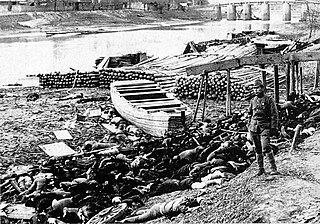
The Nanjing Massacre or the Rape of Nanjing was the mass murder of Chinese civilians in Nanjing, the capital of the Republic of China, immediately after the Battle of Nanking and the retreat of the National Revolutionary Army in the Second Sino-Japanese War, by the Imperial Japanese Army. Beginning on December 13, 1937, the massacre lasted six weeks. The perpetrators also committed other war crimes such as mass rape, looting, torture, and arson. The massacre is considered to be one of the worst wartime atrocities.
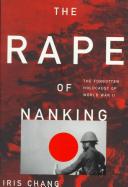
The Rape of Nanking: The Forgotten Holocaust of World War II is a bestselling 1997 non-fiction book written by Iris Chang about the 1937–1938 Nanjing Massacre — the mass murder and mass rape of Chinese civilians committed by the Imperial Japanese Army in Nanjing, the capital of the Republic of China, immediately after the Battle of Nanjing during the Second Sino-Japanese War. It describes the events leading up to the Nanjing Massacre, provides a graphic detail of the war crimes and atrocities committed by Japanese troops, and lambastes the Japanese government for its refusal to rectify the atrocities. It also criticizes the Japanese people for their ignorance about the massacre. It is one of the first major English-language books to introduce the Nanjing Massacre to Western and Eastern readers alike, and has been translated into several languages. The book significantly renewed public interest in Japanese wartime conduct in China, Korea, Southeast Asia and the Pacific.

Comfort women were women and girls forced into sexual slavery by the Imperial Japanese Armed Forces in occupied countries and territories before and during World War II. The term "comfort women" is a translation of the Japanese ianfu (慰安婦), which literally means "comforting, consoling woman". During World War II, Japanese troops forced hundreds of thousands of women from Australia, Burma, China, the Netherlands, the Philippines, Japan, Korea, Indonesia, East Timor, New Guinea and other countries into sexual enslavement for Japanese troops; however, the majority of the women were from Korea. Many women died or died by suicide due to brutal mistreatment and sustained physical and emotional distress. After the war, Japan's acknowledgment of the comfort women's plight was minimal, lacking a full apology and appropriate restitution, which damaged Japan's reputation in Asia for decades. Only in the 1990s did the Japanese government begin to officially apologize and offer compensation. However, apologies from Japanese officials have been criticized as insincere.

The International Military Tribunal for the Far East (IMTFE), also known as the Tokyo Trial and the Tokyo War Crimes Tribunal, was a military trial convened on 29 April 1946 to try leaders of the Empire of Japan for their crimes against peace, conventional war crimes, and crimes against humanity, leading up to and during the Second World War. The IMTFE was modeled after the International Military Tribunal (IMT) at Nuremberg, Germany, which prosecuted the leaders of Nazi Germany for their war crimes, crimes against peace, and crimes against humanity.

During its imperial era, the Empire of Japan committed numerous war crimes and crimes against humanity across various Asian-Pacific nations, notably during the Second Sino-Japanese and Pacific Wars. These incidents have been sometimes referred to as "the Asian Holocaust", as "Japan's Holocaust", and also as the "Rape of Asia". The crimes occurred during the early part of the Shōwa era, under Hirohito's reign.
The anti-Japanese demonstrations of 2005 were a series of demonstrations, some peaceful, some violent, which were held across most of East Asia in the spring of 2005. They were sparked off by a number of issues, including the approval of a Japanese history textbook and the proposal that Japan be granted a permanent seat on the United Nations Security Council.
Joseph Yu Kai Wong is a Canadian physician and philanthropist. He founded the Yee Hong Centre for Geriatric Care in 1987. He served as the chairman for the United Way of Greater Toronto from 1990 to 1992 and has been honorary chair since 1994.
The Three Alls policy was a Japanese scorched earth policy adopted in China during World War II, the three "alls" being "kill all, burn all, loot all". This policy was designed as retaliation against the Chinese for the Communist-led Hundred Regiments Offensive in December 1940.
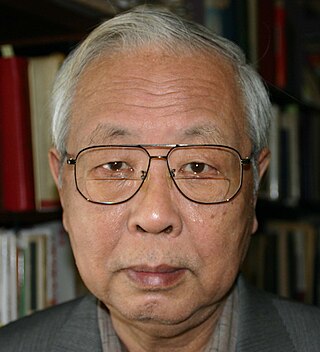
Ikuhiko Hata is a Japanese historian. He earned his PhD at the University of Tokyo and has taught history at several universities. He is the author of a number of influential and well-received scholarly works, particularly on topics related to Japan's role in the Second Sino-Japanese War and World War II.

The Memorial Hall of the Victims in Nanjing Massacre by Japanese Invaders is a museum to memorialize those that were killed in the Nanjing Massacre by the Imperial Japanese Army in and around the then-capital of China, Nanjing, after it fell on December 13, 1937. It is located in the southwestern corner of downtown Nanjing known as Jiangdongmen (江东门), near a site where thousands of bodies were buried, called a "pit of ten thousand people".
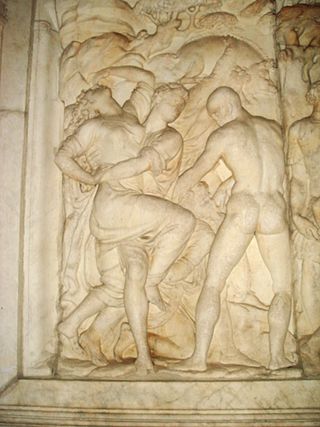
Wartime sexual violence is rape or other forms of sexual violence committed by combatants during an armed conflict, war, or military occupation often as spoils of war, but sometimes, particularly in ethnic conflict, the phenomenon has broader sociological motives. Wartime sexual violence may also include gang rape and rape with objects. It is distinguished from sexual harassment, sexual assaults and rape committed amongst troops in military service.
The Historiography of the Nanjing Massacre is the representation of the events of the Nanjing Massacre as history, in various languages and cultural contexts, in the years since these events took place. This historiography is disparate and sometimes contested, owing to conflicting currents of Chinese and Japanese nationalist sentiment and national interest, as well as the fog of war.
Allied and Japanese troops committed a number of rapes during the Battle of Okinawa during the last months of the Pacific War and the subsequent Allied occupation of Japan. The Allies occupied Japan until 1952 following the end of World War II and Okinawa Prefecture remained under US governance for two decades after.

Kim Hak-sun (1924–1997) was a Korean human rights activist who campaigned against sex slavery and wartime sexual violence. Kim was one of the victims who had been forced into sexual slavery by the Japanese Imperial Army between the early 1930s up until the end of the Pacific War. She is the first woman in Korea to come forward publicly and testify her experience as a comfort woman for the Japanese military. Her testimony was made on 14 August 1991. In December 1991, she filed a class-action lawsuit against the Japanese government for the damages inflicted during the war. She was the first of what would become hundreds of women from Korea, China, Taiwan, the Philippines, Indonesia, and the Netherlands who came forward to tell their stories of their enslavement to the Imperial Japanese military. She was inspired to finally take her story public after 40 years of silence by the growth of the women's rights movement in South Korea. Kim died in 1997 and her court case was still ongoing.
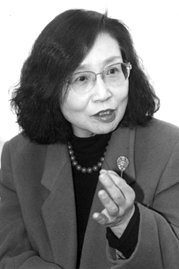
Yayori Matsui was a Japanese journalist and women's rights activist noted for her work to raise awareness of sex slaves and sex tourism in post-war Asia. In 1961 she began work as a journalist for the newspaper Asahi Shimbun, retiring in 1994 to work as a full-time social activist, founding numerous women's organizations and writing on gender inequality in Japan and on sex crimes committed by the Japanese Imperial Army, namely against the comfort women of the Second World War. Her work culminated in the 2000 Tokyo Women's War Crimes Tribunal, a tribunal held to gain some form of justice for the victims of Japanese military sexual slavery.
Lee Yong-soo is a former comfort woman from South Korea. Lee was forced to serve as a sex slave during World War II by the Imperial Japanese Army. She is one of the youngest comfort women still living.

The Bahay na Pula is a former hacienda in San Ildefonso, Bulacan in the Philippines. The site is remembered for the mass rapes and murders committed by the Imperial Japanese Army during World War II. The Japanese military murdered all of the men and boys in the adjacent Mapaniqui, Candaba, Pampanga, and forced over 100 women and girls into sexual slavery, confining and raping them in the Red House.
The Korean Council for the Women Drafted for Military Sexual Slavery by Japan is a Korean non-governmental organization advocating the rights of the surviving comfort women and lobbying the Japanese government to take actions of a full apology and compensation.
The Peace Monument of Glendale is an exact replica of the original memorial dedicated to comfort women, the Statue of Peace. The statue is located in Central Park near the Glendale Public Library in Glendale, California, United States. The Glendale Peace Monument was funded and built in 2013 by the Korean American Forum of California, a non-profit human rights organization. The installation of the memorial happened shortly after Toru Hashimoto, former mayor of Osaka, Japan, expressed that comfort women were necessary to maintain discipline within the Japanese army during World War II. The unveiling of the statue was also considered a celebration due to the passing of a 2007 United States House of Representatives resolution, which urged the Japanese government to accept responsibility for their wartime crimes.
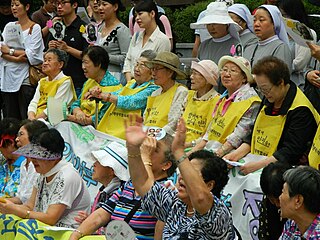
Gil Won-ok, also known as Grandma Gil, is an activist and former Korean comfort woman who has dedicated her life to demanding redress and an official apology from Japan for the military sexual violence that affected over 200,000 women during World War II.











